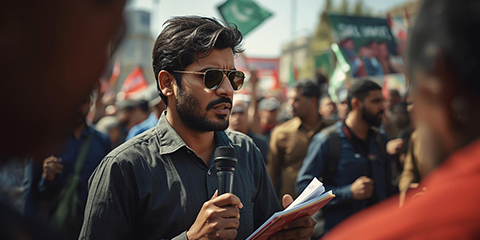Behind the byline: The realities of life as a freelance journalist
JournalismPakistan.com | Published: 28 July 2024 | Tariq Ali
Join our WhatsApp channel
Freelance journalists in Pakistan face significant challenges including financial instability and safety risks. These factors affect their ability to report effectively and maintain mental well-being.Summary
ISLAMABAD—Freelance journalism is a demanding profession characterized by independence and flexibility, but it also comes with a unique set of challenges that impact the lives and work of journalists worldwide. From financial instability and safety concerns to legal threats and credibility issues, freelance journalists navigate a complex landscape to bring important stories to the public.
Financial Instability
One of the most pressing challenges faced by freelance journalists is financial instability. Unlike staff reporters who receive a regular salary, freelancers are often paid per article or project. This can result in inconsistent income, making it difficult to budget and plan for the future.
For instance, in Pakistan, freelance journalists often struggle to secure steady work. According to a survey by the Pakistan Federal Union of Journalists (PFUJ), many freelancers report that they are underpaid and sometimes have to wait months to receive payment for their work. This financial uncertainty can deter talented journalists from pursuing freelance careers, limiting the diversity of voices in the media.
Safety Concerns
Safety is another major concern for freelance journalists, especially those working in conflict zones or covering sensitive topics. Without the support of a major news organization, freelancers often lack access to resources and protection that staff journalists might have.
In Pakistan, the dangers are particularly acute. Freelance journalists covering issues such as terrorism, political corruption, and human rights abuses face threats from both state and non-state actors. The case of Malik Mumtaz, a freelance journalist who was killed in the tribal areas of Pakistan in 2013, underscores the grave risks faced by independent reporters. His death highlighted the lack of safety measures and support systems for freelancers in volatile regions.
Legal Threats
Freelance journalists are also vulnerable to legal threats, including lawsuits for libel and defamation. Without the legal backing of a media organization, freelancers must often bear the cost of legal defense themselves, which can be prohibitively expensive.
In Pakistan, the legal environment can be particularly hostile to freelance journalists. Defamation laws are frequently used to intimidate and silence journalists. In 2020, Shahzeb Jillani, a freelance investigative journalist, faced charges of cyberterrorism and defamation after publishing articles critical of the military. Although the charges were eventually dropped, the case illustrated the precarious legal position of freelance journalists in Pakistan.
Credibility Issues
Freelance journalists sometimes face challenges in establishing and maintaining credibility. Without the institutional support of a well-known media outlet, it can be difficult to gain the trust of both sources and audiences.
However, many freelancers overcome these hurdles through persistence and by building strong personal brands. Pakistani journalist Asad Hashim, who has reported for Al Jazeera as a freelancer, has gained recognition for his insightful coverage of complex issues such as the Pashtun Tahafuz Movement (PTM). His success demonstrates that despite the credibility challenges, talented freelance journalists can still make significant contributions to the field.
Mental Health
The pressures of financial instability, safety concerns, and legal threats can take a toll on the mental health of freelance journalists. The isolation of working independently can exacerbate feelings of stress and anxiety.
In Pakistan, where the media environment is particularly challenging, the mental health of journalists is a growing concern. Organizations like the Digital Rights Foundation (DRF) are beginning to offer support and resources for journalists dealing with trauma and stress. These initiatives are crucial in helping freelance journalists cope with the psychological demands of their work.
Freelance journalists play an essential role in bringing diverse and critical stories to the public, but they do so at great personal risk and sacrifice. Financial instability, safety concerns, legal threats, credibility issues, and mental health challenges are significant obstacles that freelance journalists must navigate daily.
In Pakistan, these challenges are particularly pronounced, yet freelance journalists continue to persevere, driven by a commitment to uncovering the truth and informing the public.
About the author: Tariq Ali is a freelance journalist. He covers a wide range of topics including digital media trends and their impact on traditional journalism.
KEY POINTS:
- Financial instability hinders freelance journalists' ability to budget.
- Safety concerns are heightened for those covering sensitive topics.
- Legal threats can jeopardize freelancers' careers and finances.
- Credibility issues arise without the backing of mainstream media.
- Mental health is adversely affected due to high-stress work conditions.

























